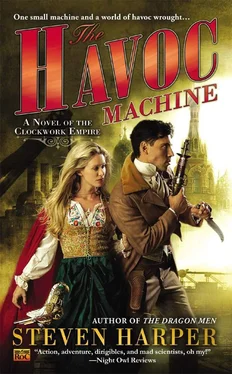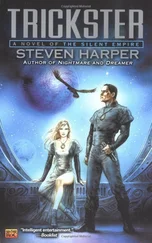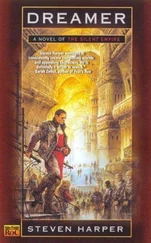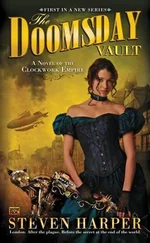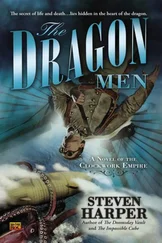Steven Harper - The Havoc Machine
Здесь есть возможность читать онлайн «Steven Harper - The Havoc Machine» весь текст электронной книги совершенно бесплатно (целиком полную версию без сокращений). В некоторых случаях можно слушать аудио, скачать через торрент в формате fb2 и присутствует краткое содержание. Год выпуска: 2013, ISBN: 2013, Издательство: ROC, Жанр: sf_fantasy_city, на английском языке. Описание произведения, (предисловие) а так же отзывы посетителей доступны на портале библиотеки ЛибКат.
- Название:The Havoc Machine
- Автор:
- Издательство:ROC
- Жанр:
- Год:2013
- ISBN:9781101601983
- Рейтинг книги:4 / 5. Голосов: 1
-
Избранное:Добавить в избранное
- Отзывы:
-
Ваша оценка:
- 80
- 1
- 2
- 3
- 4
- 5
The Havoc Machine: краткое содержание, описание и аннотация
Предлагаем к чтению аннотацию, описание, краткое содержание или предисловие (зависит от того, что написал сам автор книги «The Havoc Machine»). Если вы не нашли необходимую информацию о книге — напишите в комментариях, мы постараемся отыскать её.
The Havoc Machine — читать онлайн бесплатно полную книгу (весь текст) целиком
Ниже представлен текст книги, разбитый по страницам. Система сохранения места последней прочитанной страницы, позволяет с удобством читать онлайн бесплатно книгу «The Havoc Machine», без необходимости каждый раз заново искать на чём Вы остановились. Поставьте закладку, и сможете в любой момент перейти на страницу, на которой закончили чтение.
Интервал:
Закладка:
“Marsovo Pole,” Sofiya said. The Field of Mars. She started across the flat dusty field toward the grandstand, her scarlet cloak stirring in the slight breeze. “It is named after the Roman god of war, of course. That building over there”- she pointed at the long, pillared structure-“is an army barrack. And that is the River Neva. The cannon is fired from the roof of the Peter and Paul Fortress on the other side every day at noon.”
“Why did we rush so? What is everyone gathering for?”
“That.” Sofiya pointed toward the River Neva. A wide road ran from the edge of the Field of Mars, between two blocky buildings, and up to a great pontoon bridge, easily four carriages wide and supported underneath by what looked like a long row of giant rowboats turned upside down. Thad dug around in his memory for what little he knew about Saint Petersburg and recalled that even though it was a city of rivers, canals, and giant islands, Peter the Great had forbidden permanent bridges on the grounds that they were ugly. But either pontoon bridges were exempted from his ban, or Tsar Alexander had changed the law himself-Thad couldn’t remember. The pontoon bridges weren’t high enough to allow anything but the lowest boats to slip beneath them, which curtailed ship traffic on the river but encouraged thriving schools of rowboats, skiffs, and rafts.
On the other side of the river was one of Saint Petersburg’s enormous islands. The bridge to it had been cleared of all traffic but for a single cart. The cart had no horse and no driver. It was painted gold and azure, and ornate designs and curlicues wound their way all over it like metal vines. Underneath the cart puffed a little engine that was currently following a strip of iron laid across the bridge. On the bed of the cart was golden cage of sturdy bars, and in the cage was a man. He was naked, and his skin was covered in dirt and filth. His hair and beard tangled into a greasy mess, and he clung to the bars with both hands and feet like a chimpanzee. Animal growls and snorts emerged from his throat.
By now Thad and Sofiya were closer to the roofed-over grandstand, and Thad could see the people better. Their clothing was rich beyond belief. The women wore enormous off-the-shoulder dresses of satin and velvet embroidered with metallic thread in geometric designs. The sleeves were narrow at the top and ballooned out toward the wrist, and the skirts were so wide and heavy with crinolines, a single woman might take up four spaces on the grandstand. Most sported fox or ermine wraps against the chilly air. One woman, looking pale and sickly, wore a formfitting cage of actual gold wire with tiny gears, wheels, and pistons in it that whirled and twisted the soft wire to bend it with her every move. All the women’s hair was elaborately styled, curled and piled high and laden with jeweled pins or combs. Their faces were painted with rouge and puffed with powder. Many of the men wore military uniforms-bright blue coats that dripped gold braid from their chests and shoulders over bloodred trousers. Mustaches and side whiskers were waxed and pointed, though actual beards were absent. Their shiny black boots were pointed, and some curled upward. The nonmilitary men wore elaborate coats of their own, ones that nearly reached their knees.
Little automatons zipped and scampered about the grandstand, either on spidery legs or flying with whirling propellers. They carried golden cups and pitchers of what Thad guessed was wine or coffee. He doubted anyone here drank giras. The automatons also brought little plates of dainty food, and linen napkins. One lady dropped her fur wrap, and a whirligig automaton dove in to catch it before it touched the ground.
A contingent of soldiers in blue uniforms and hats with rifles over their shoulders surrounded the grandstand, and to one side, motionless beneath the cloudy sky, stood several rows of automatons. They were vaguely human-shaped, with glass bulbs in place of eyes and unmoving speaker grills for mouths. Some had hands, others had something like chunky mittens. Many were dented or sooty. Curlicue designs crawled across a few of them.
Thad and Sofiya made their way to a place some distance from the soldiers guarding the grandstand at the edge of the Field of Mars. A few other people, presumably servants or other lower-born people who worked among the wealthy, had gathered there as well. The richly clad people were settling into their seats, laughing and talking and taking dainties from automaton-borne trays. The cart with the golden cage finished crossing the bridge, puttered down between the blocky buildings past a statue of Mars, and entered the field proper. The man inside continued to hoot and shout and even gnaw at the bars of his golden cage.
“That’s a clockworker in the final stages of his disease,” Thad said, speaking English to keep their conversation private. “That’s plain to see. But who are all these people?”
“The tsar’s court,” Sofiya replied tightly. “That woman wearing the gold wire is Maria Alexandrovna, the tsarina. Her health is poor. That boy next to her, the huge one who looks like he could wrestle a bear to the ground, that is her son Alexander III. They call him Prince Alexei to separate him from his father. I don’t see the tsar himself.”
“And what’s going to happen?” Thad asked, though he was fairly sure he knew the answer.
“It’s a circus,” she said. “A lovely, delightful circus.”
The courtiers were taking notice of the clockworker in his golden cage. A number paused in their conversation to point or laugh or snicker to one another behind glittering fans. The cart stopped in front of the grandstand, and a silence fell over the entire Field of Mars.
“The machines will think!” yelled the clockworker in Russian from his cage. “They think and they decide which way to cut like silver knives slice silken flesh. You walk on edge and one day you will be pushed over the side. The machines will make you swallow the knives. Swallow the knives!”
He urinated through the bars, and the court laughed. Prince Alexei leaped to his feet and bounded down the steps to the field, where he opened the cage door and bodily yanked the clockworker to the ground by the shackles attached at his wrists and neck. The burly young man had more than a head on the clockworker, whose starved ribs showed through his skin. The clockworker landed badly on his side, and Thad heard the wet snap of bone giving way.
“Come now!” called Alexei to the clockworker, but obviously addressing the assembled court. “Invent something for us!”
The clockworker didn’t seem to notice one of his arms was broken. He looked blearily about, as if searching for something. “The machine grows and grows, but it cannot think. It sends fingers and toes in all directions, searching for a way to think. It wants to think. It has to think.”
“Fingers! As you say!” Alexei brought his heavy boot down on the clockworker’s hand. It crunched. This time the clockworker howled. Thad felt sick, and his new brass hand clenched. Sofiya looked green.
Alexei laughed and gestured at the assembly of automatons. “Mechanical seventeen Borovich. Awake! Come!”
One of the automatons blinked to life and stepped forward, out of line. It marched toward the prince with precise metal steps. “What do you command, ser?” Its voice was heavily mechanical, nothing at all like Nikolai’s, or even Dante’s.
Alexei handed the automaton the ends of the clockworker’s chains. “Hold this. Now march. Double time!”
The automaton marched at the speed of a trotting horse, dragging the clockworker across the gravel behind it. The clockworker howled and spat and bit at the chains, his eyes wild as exploding stars. Stones tore open his skin and his broken arm flopped uselessly. Sofiya grasped Thad’s upper arm with pale fingers. Thad didn’t know how to react to all of this. The man was a clockworker, and who knew what he had done or who he had done it to, but this kind of torture wasn’t anything Thad wanted to be part of. Thad killed clockworkers quickly, a mercy they rarely gave their victims.
Читать дальшеИнтервал:
Закладка:
Похожие книги на «The Havoc Machine»
Представляем Вашему вниманию похожие книги на «The Havoc Machine» списком для выбора. Мы отобрали схожую по названию и смыслу литературу в надежде предоставить читателям больше вариантов отыскать новые, интересные, ещё непрочитанные произведения.
Обсуждение, отзывы о книге «The Havoc Machine» и просто собственные мнения читателей. Оставьте ваши комментарии, напишите, что Вы думаете о произведении, его смысле или главных героях. Укажите что конкретно понравилось, а что нет, и почему Вы так считаете.
